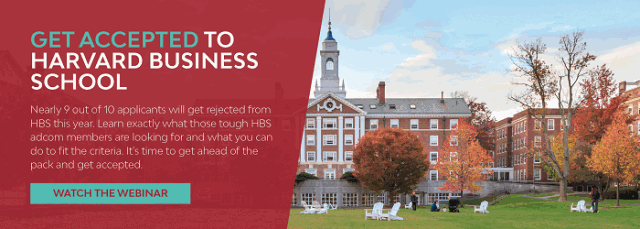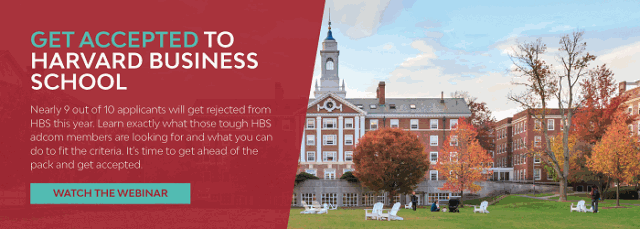
This sample essay is from
The Harbus MBA Essay Guide Summer 2016 Edition and is reprinted with permission from Harbus.
Author’s Home Country: United States of America
Author’s Previous Industry/Profession: Operations consulting, operations management
Author Gender: MaleAnalysis: The author focuses his essay on two themes - his professional experience as an operations consultant and an experience which motivated him to go for an MBA. Through the essay, the author is able to highlight his professional skills, achievement as well as give a clear picture of his long-term career plans and his reasons for doing an MBA.
I’m [APPLICANT’S FIRST NAME] and I have journeyed here from the hallowed grounds of [APPLICANT’S U.S. NEW ENGLAND HOMETOWN], where I spent my formative years amid wild dreams of achieving greatness by setting world records and winning the Olympics. As I’ve hung up my [OLYMPIC SPORT’S TRADITIONAL SHOES] in favor of business shoes, those dreams have evolved into a desire to achieve greatness in a different arena. Today, my dream centers on helping companies leverage technology to propel their operations into the future, providing unparalleled customer service and delivery, with an operational efficiency to match.
I graduated with a BS in Mechanical Engineering in [GRADUATION YEAR] and spent my first 3 years out of college working as an operations consultant. It was my job to walk into a manufacturing plant and drive significant operational change – for example, I once spent 3 months walking the sticky floors of a milk plant in [MID-SIZED U.S. SOUTHEASTERN CITY] helping plant management boost throughput by 30% in order to take on a new customer. We accomplished this goal with zero capital spend, a feat many had believed was impossible. In our projects, the biggest challenge was almost always convincing managers to reach for that extra tad of unseen opportunity hiding within the operation, because oftentimes it was very difficult to look beyond the daily struggles that plagued their operations. I worked directly with 5-8 person “rapid results teams,” coaching them on how to think about operational improvement, motivating them to sprint towards it, and leading them through the analysis required to capture it. I left those milk, water and oil sands plants with many enduring friendships and inspiring operational victories borne from our journey from ambitious goals to concrete results.
I’ve spent the past two years working in supply chain management at a private industrial goods supplier. I chose direct management because I wanted to drive these same inspirational improvements in an operation I owned. My role was to manage and improve the operation, and through my experience, I learned the nuts and bolts of the supply chain industry. However, my dream of innovating supply chain operations pushed me to consider transitioning to an organization with an ambitious, transformative purpose. In fact, last year I had a unique opportunity to reflect on what type of impact matters to me. This opportunity was my first ever trip to [NORTHWEST AFRICAN REGION], the place of my family’s origin.
On the second day of the trip, I journeyed to [LOCAL NORTHEASTERN AFRICAN TOWN], a small town nestled next an enormous active volcano that is surrounded by a wide expanse of rich volcanic soil, which is used to make wine. This wine is sipped by adventure-seeking tourists relaxing after a long day on the volcano, and thus the town’s two major industries, wine and tourism, are sustained. When we arrived at the town, I was shocked to see it buried by an avalanche of volcanic rock from an eruption [A FEW YEARS PRIOR]. As our guide lamented on the dreary prospects of the Page 2 of 2 town, I was amazed to see just how important these two industries had been to its development.
Through this real world example, I was able to clearly visualize the impact businesses can have on their broader environment, an understanding that had not been as evident to me while working in the larger, more complex American economy. For example, I had spent hours walking among the dilapidated buildings speckling the warehouse district in Cleveland, but only after my trip did I connect them to the decline of the Midwestern manufacturing industry. Upon my return, armed with this broader perspective, I decided my next step would be to attend business school. There I would gain the technical, operational and leadership skills to make my transition to an organization whose goal was to drive change in its broader industry and community, as those wine and tourism companies had done in [LOCAL NORTHEASTERN AFRICAN TOWN OF FAMILY’S ORIGIN].
So, that is how I arrived in front of you today. My goal is to humbly learn as much as I can from our section, our professors, and our experiences. I am excited to get to know you, and will always do my best to support our section intellectually and athletically (we will be the future section Olympics champions!).
How about yourself?
Word Count: 711
Author’s comments: While the initial draft of my essay did not take more than an hour or two, it was the revision process that I spent a significant amount of time on. I think the most important part of the essay writing process is to ensure that your story and personality come through - and this is perhaps the most difficult part! To help with this, I had individuals who were not as familiar with my story and why I wanted to go to business school provide me with feedback in addition to those with whom I worked closely.
Linda’s Comments:I would hate for any of you to read this essay or any of the other essays in
The Harbus MBA Essay Guide, which I recommend, and think “This is a great template. I’m going to tell a story just like this one!” Bad idea. Wrong response.
The one take-away from this essay and the other successful essays in this book is that the reader feels a little like s/he is meeting the author – not someone else and not some masked being. Individuality is the common thread in those essays; it isn’t brilliant prose or incredible writing. It’s authenticity and humanity. And yes, the author is accomplished too.
I chose this essay from the Harbus collection because I know there many engineers applying. Some -- both in and out of their field-- think of the profession as boring or common. But this essay is neither boring nor common. I loved it because the writer comes to life, and
his passion and personality shine through. He doesn't get bogged down in technicalities, industrial jargon, or an alphabet soup of acronyms. He tells his story with energy and clarity, from his perspective, and with a focus on his impact. Now that's an example you can follow: Tell your story with energy and clarity, from your perspective, and with a focus on your impact
I realize that you are responding to a different question than the author did.
This year you are directly addressing the admissions committee readers. Still, the goal is the same. You want your readers to feel like that they are meeting you — not someone else, not a scripted piece of shallow spin devoid of individuality and humanity, and not some phony combo of you and the author of an essay in a guidebook or on a website. They really and truly want to meet YOU!
So think about your story and perspective. What would you like the admissions committee to know about you that they won't know from the rest of your application?

 Related Resources:
Related Resources:
•
Harvard Business School 2016-17 MBA Essay Tips & Deadlines
•
What is HBS Looking For?
•
From Example to Exemplary: What You can Learn from Sample Essays to Make Your Essays OutstandingThis article originally appeared on
blog.accepted.com.
Applying to a top b-school? The talented folks at Accepted have helped hundreds of applicants get accepted to their dream programs. Whether you are figuring out where to apply, writing your application essays, or prepping for your interviews, we are just a call (or click) away.
Contact us, and get matched up with the consultant who will help you
get accepted!



 Harvard Business School continues to provide one open-ended essay question to applicants. This year the essay is required (unlike two years ago) but the essay question has changed from last year, and is instead much more flexible (like two years ago).
Harvard Business School continues to provide one open-ended essay question to applicants. This year the essay is required (unlike two years ago) but the essay question has changed from last year, and is instead much more flexible (like two years ago).


















